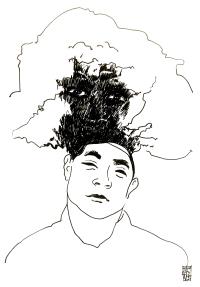Puanga
The children are making the river.
They have sand and pumice. They have ferns.
A teacher unrolls masking tape,
presses a map to the wall.
There are birds which sing when squeezed.
Wild-eyed, a girl clings to a tūī.
There are little whare, into which
the birds can be inserted.
A boy carries the kōkako
around all morning.
*
Over the radio, silence.
Then the swish of piupiu
tread of feet
pat of plastic poi.
Stillness. Silence moves
across the airwaves
a drum, a guitar strum
breaks it. Girls open their throats.
The sound of lungs filling.
The sound of tongues loosing.
*
This is Puanga, or Rigel.
The laser pointer circles the gleam.
Children’s heads silhouetted
by the projector,
continually in movement.
This is Matariki, or the Pleiades,
or Subaru.
But it’s difficult to see from Whanganui,
so Puanga is the star
we look for in the new year.
*
The children have made star biscuits.
They have harakeke. They are weaving stars.
Milo in the star-cave,
telescopes searching cloud.
They have playdough the colour
of night sky, filled with glitter.
Dressing gowns, gumboots, woolly hats.
A brazier in the sandpit.
The smell of damp air.
The smell of burning sugar.
*
It is a time for planting.
A child chooses a pine
with blue-grey needles.
It will bear nuts in forty years.
A time for gathering.
Pink yam fingers poke from the soil.
A time to prepare new ground.
Bared black of loam.
Where can we plant this tree?
Where will it cast its shadow?
*
From here, Puanga.
From here, Rigel.
In the sky a hunter stands
on his hands,
both feet upwards.
In a tank a real eel.
The silver of īnanga.
The stones are lined up,
the birds are positioned.
The children are making the river.
Listen
There goes a woman walking on, down time.
Her face creased with all the things it’s ripe to
take into account. It’s time to listen
for the slow push of mud, its murky truth
under the current. Face the round-about
mirror, which is ready to reflect us.
And who would claim to speak for all of us?
All our thinking is muddied by our time,
what does anyone really know about
the strata we’re in, sedimented to
the layers below, not in them. The truth
is only sometimes spoken. Still. Listen.
Dead premier drinking your beer, listen.
The river you’re in is one that cuts us
through. Rolling in the thick bed, headless, truth
disjoints you. On the bank, tram tracks mark time,
a vintage daydream easy to succumb to,
still, with the sense of things not talked about.
Before we figure what we know about
the movement of things, we need to listen.
The dead mayor wakes in the night, hearkens to
leaf music. He grasps his stick: them or us!
Be prepared to hear that, now you’ve made time
to sit down, you have no claim upon truth.
For those whose tales you’re after, it’s their truth,
not yours, no tag to be bandied about,
if you’d listen at all. Sound of this time
is sound of people talking. To listen
requires concessions difficult for us.
It requires conclusions hard to come to.
The train steams over the bridge, but where to?
The steamboat under it, clouding the truth
in sumptuous smoke. A photograph of us
is a photograph of bridges, about
to reach respective other sides. Listen,
ear to ground, for lightning earthing. Through time.
Is it too much for us to listen to?
This vital time, it’s not so much the truth
but what it’s about, that makes us listen.
Autumn
The young man is listening to the river.
Headphones on, behind the bookshelves.
Out comes the sound of spent years.
Out come the voices gone before.
Hands holding branches,
the silver under leaves.
There are some areas
we fought for. . .
The fuzzy scrawl of a spray-can.
The curve of a cop’s helmet.
*
A man drives past the library,
three dogs and two cats in the back.
The shakes in his wrists,
the sun on his neck.
Rain comes and the hills resume
their seasonal slumping.
Hens stop laying, gullies
darken with mud.
Children squeeze hail in their mittens
yelp with cold and pleasure.
*
Hue are strung in the slash,
green and bulbous.
Warts swell on the French pumpkins,
bean pods blacken,
kamokamo thicken their skins.
The buns rise best on Sunday
because Christ rose again.
If the shearer’s cook
makes green jelly
it means it will rain.
*
Two thousand years since the last eruption
a steady supply of pumice continues.
Broken reeds floating,
a flat rugby ball, a gatepost acorn.
Beautifully inked, a man
drags a kahawai from the water.
A branch catches in the paddlewheel.
Bearing a row of seagulls.
The white streaks on the fig tree
look like bat shit, but they are bleeds of sap.
*
Stone by stone
the monument is rebuilt.
Chunks of shellrock sprayed
with fluoro yellow numbers.
Mortar carried up the scaffold
in bright orange buckets.
The standard chain
is wearing into dirt.
Has the moving earth
narrowed its two brass bolts?
*
Anzac wreaths lain
on the colonial lion.
The radio sings
of Rua Kenana:
Told his people not to go to war.
While Calbuco blows up,
Ruapehu is orange, serene.
The stone soldier’s face is calm
as the crane lifts him, re-places
his feet on their rock.
Biography Airini Beautrais
Airini Beautrais is the author of three books of poetry, most recently Dear Neil Roberts (VUP 2014). She is currently working on a PhD in creative writing. Part of this project is a creative work about the Whanganui river focusing on environmental and social issues, including the effects of colonisation.
